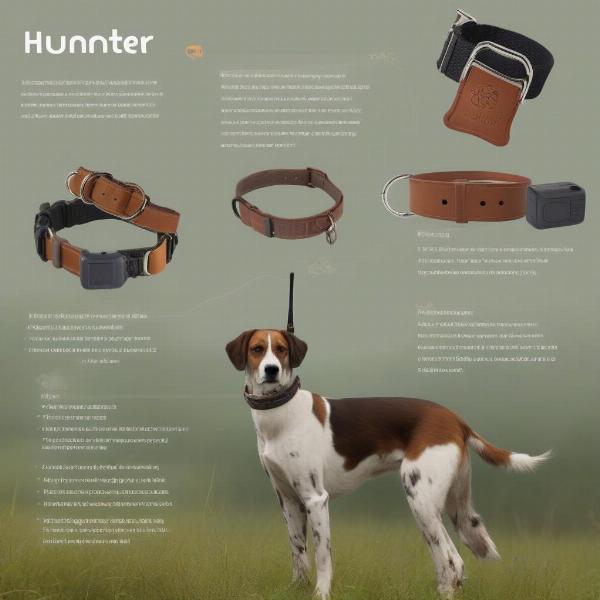Hunter dog collars are an essential piece of equipment for anyone who enjoys hunting with their canine companion. Choosing the right collar can significantly impact your dog’s safety, performance, and overall well-being during hunts. This guide explores the various types of hunter dog collars available, factors to consider when choosing one, and essential tips for proper usage.
Types of Hunter Dog Collars
Hunter dog collars are designed with specific features to cater to the unique needs of hunting dogs. The most common types include:
-
Tracking Collars: These collars utilize GPS technology to pinpoint your dog’s location, ensuring you can easily find them even in dense terrain. They are invaluable for tracking dogs that range far and wide during hunts.
-
E-Collars (Electronic Collars): Also known as training collars, e-collars allow hunters to communicate with their dogs remotely through vibrations, tones, or static stimulation. They can be used for reinforcement during training and for recalling dogs in the field.
-
Beeper Collars: Beeper collars emit audible beeps at regular intervals, helping hunters locate their dogs in thick cover. The beeps vary in frequency and intensity depending on the dog’s movement, providing valuable information about their activity.
-
Traditional Collars: While not specifically designed for hunting, durable traditional collars made from leather or nylon can be suitable for some hunting situations. They are often used in conjunction with a separate tracking or beeper device.
 Different Types of Hunter Dog Collars
Different Types of Hunter Dog Collars
Choosing the Right Collar for Your Hunting Dog
Selecting the appropriate hunter dog collar requires careful consideration of several factors, including:
-
Hunting Style and Terrain: The type of hunting you engage in and the terrain you frequent will influence your collar choice. For example, a tracking collar is crucial for hunts in dense forests, while a beeper collar might be sufficient in more open areas.
-
Dog’s Breed and Temperament: Certain collar types are better suited for specific breeds and temperaments. A highly sensitive dog might not be a good candidate for an e-collar, while a tenacious breed might benefit from the added control it offers.
-
Collar Features and Functionality: Consider the features offered by each collar type and how they align with your hunting needs. Features like range, battery life, and water resistance are important considerations.
-
Budget: Hunter dog collars vary significantly in price. Determine your budget beforehand to narrow down your options and choose a collar that offers the best value for your money.
Using Hunter Dog Collars Responsibly
Responsible usage of hunter dog collars is crucial for the safety and well-being of your dog. Follow these tips to ensure proper usage:
-
Proper Fit and Adjustment: Ensure the collar fits snugly but not too tight. You should be able to fit two fingers comfortably between the collar and your dog’s neck.
-
Training and Acclimation: Introduce your dog to the collar gradually and positively. Use positive reinforcement techniques to acclimate them to the collar’s sensations and sounds.
-
Battery Maintenance: Regularly check and replace the collar’s batteries to ensure it functions correctly, especially before heading out on a hunt.
-
Ethical Considerations: Use e-collars responsibly and humanely. Avoid excessive or unnecessary stimulation, and always prioritize positive reinforcement methods.
Conclusion
Choosing the right hunter dog collar is a vital decision for any hunter. By carefully considering your hunting needs, your dog’s characteristics, and the various collar types available, you can ensure a safe and successful hunting experience for both you and your canine companion. Remember to always prioritize responsible collar usage and the well-being of your hunting partner. A well-chosen and properly used hunter dog collar is an investment in your dog’s safety, performance, and the enjoyment of your shared hunting adventures.
FAQ
- What is the best hunter dog collar for beginners? A traditional collar paired with a separate tracking device can be a good starting point for beginners.
- Are e-collars safe for dogs? When used responsibly and humanely, e-collars can be a safe and effective training tool.
- How long do the batteries last in tracking collars? Battery life varies depending on the model and usage, but typically ranges from 12 to 48 hours.
- Can I use a hunter dog collar for everyday walks? While some collars can be used for everyday walks, it’s best to consult the manufacturer’s recommendations.
- What is the range of a typical tracking collar? Tracking collar range varies depending on the model and terrain, but can extend up to several miles.
- How do I clean a hunter dog collar? Follow the manufacturer’s instructions for cleaning. Most collars can be wiped down with a damp cloth.
- Where can I buy hunter dog collars? Hunter dog collars are available at sporting goods stores, pet supply stores, and online retailers.
Related Articles
ILM Dog is your trusted resource for all things dog-related. We provide expert advice on dog breeds, health and medical care, training and behavior, nutrition, grooming, and much more. Our passion is helping dog owners provide the best possible care for their canine companions. Contact us today for expert advice and discover how we can help you navigate the wonderful world of dog ownership! Email: [email protected] Phone: +44 20-3965-8624 Visit ILM Dog for more information.